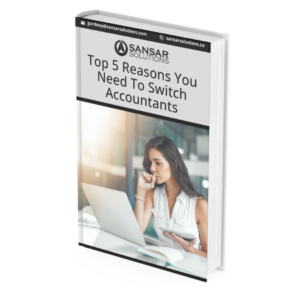Corporate Year End Tax Filing Best Guide

Seek professional guidance for your corporate year end tax filing? Keep on reading to learn more details about what you should know.
Table of Contents
Determining your business tax year end
Determining your business tax year-end in Canada is a crucial step for tax planning and compliance. For corporations, the tax year-end is typically the end of the fiscal period for which the corporation will report its income and expenses.
A new corporation can choose its tax year-end when filing its first corporate income tax return (T2) by selecting a fiscal period end date within 53 weeks of its date of incorporation.
Most corporations align their fiscal year-end with the calendar year, ending on December 31st, but this is not mandatory.
A corporation can choose any date that suits its business cycle. However, once the tax year-end is chosen and the first tax return is filed, changing the fiscal year-end requires approval from the Canada Revenue Agency (CRA).
For sole proprietors and partnerships, the tax year is the calendar year, from January 1st to December 31st. Sole proprietors and partnerships report their business income or loss on their personal income tax returns (T1), and thus must align with the personal tax year.
It’s important to carefully consider the choice of fiscal year-end as it can have implications for tax planning and cash flow management. Consulting with a tax professional can help determine the most advantageous tax year-end for your business.
Preparing for corporate year end tax filing
Preparing for corporate year-end tax filing is a critical process that requires thoroughness and attention to detail. It begins with closing your books to ensure all financial transactions for the fiscal year are accurately recorded, providing a clear snapshot of the company’s financial status.
Reconciling accounts is next, ensuring that bank statements, credit cards, and loans align with your records. For businesses with inventory, conducting an accurate count near the year-end date is essential for correct valuation and cost of goods sold calculations.
Gathering all necessary financial documents, such as bank statements, invoices, and payroll records, is crucial for supporting the figures reported on your tax return.
Identifying potential deductions and tax credits can significantly reduce tax liabilities, making it important to review these opportunities carefully. Consulting with a tax professional can offer valuable insights into tax planning and compliance.
Generating financial statements, including income statements and balance sheets, is essential for tax filing and strategic planning.
Finally, knowing the filing deadlines and planning for the next fiscal year can help avoid penalties and set a solid foundation for future financial health.
By following these steps, corporations can navigate the complexities of corporate year end tax filing efficiently, ensuring compliance and optimizing financial outcomes.
Corporate year end checklist for tax filing
To help you prepare for filing your taxes, Sansar Solutions has put together a corporate year end checklist that covers everything that should be considered when filing corporate taxes.
| Task | Description |
|---|---|
| Close the Books | Ensure all financial transactions are recorded. |
| Reconcile Accounts | Match all accounts with bank statements. |
| Inventory Count | Conduct an accurate inventory assessment. |
| Review Receivables/Payables | Assess all outstanding amounts. |
| Gather Financial Documents | Collect all necessary documentation. |
| Identify Deductions/Credits | Review eligible deductions and credits. |
| Consult a Professional | Seek advice from a tax professional. |
| Prepare Financial Statements | Generate income statement, balance sheet, etc. |
| File Tax Returns | Know and meet the filing deadlines. |
| Plan for Next Year | Review financial performance and plan ahead. |
Claiming deductions and credits
Claiming deductions and credits is a crucial aspect of the tax filing process in Canada, as it can significantly reduce the amount of tax you owe or even increase your refund. Deductions lower your total taxable income, while credits reduce your tax payable on a dollar-for-dollar basis.
Here’s a brief overview:
Deductions
Business Expenses: For self-employed individuals and businesses, most expenses incurred to earn business income are deductible. This includes costs like rent, utilities, supplies, and salaries.
RRSP Contributions: Contributions to a Registered Retirement Savings Plan (RRSP) are deductible and can lower your taxable income.
Home Office Expenses: If you work from home, a portion of your home expenses, such as internet, electricity, and rent, may be deductible.
Capital Cost Allowance: Depreciation on assets used in a business or professional activities can be claimed as a deduction.
Credits
GST/HST Credit: A non-taxable quarterly payment that helps individuals and families with low or modest incomes offset all or part of the GST or HST they pay.
Canada Child Benefit (CCB): A tax-free monthly payment made to eligible families to help with the cost of raising children.
Charitable Donations: Donations made to registered charities can provide a non-refundable tax credit.
Medical Expenses: You can claim a credit for eligible medical expenses incurred for yourself, your spouse or common-law partner, and certain related persons.
To maximize your deductions and credits, it’s important to keep detailed records and receipts throughout the year.
Understanding the specific eligibility criteria and limits for each deduction and credit is also crucial. For complex situations or to ensure you’re maximizing your tax benefits, consulting with a tax professional can be beneficial.
GST / HST considerations for corporate tax filing
In Canada, Goods and Services Tax (GST) and Harmonized Sales Tax (HST) considerations are essential for businesses of all sizes. GST is a 5% federal tax applied to most goods and services, while HST is a combined tax that includes GST and provincial sales tax, applicable in certain provinces at varying rates.
Key Considerations
Registration: Businesses with $30,000 or more in total revenue from taxable supplies within a 12-month period must register for a GST/HST account. Smaller businesses can register voluntarily to claim input tax credits.
Collecting GST/HST: Registered businesses must collect GST or HST on taxable sales, leases, and services in Canada. The rate depends on the province or territory where the business operates or where the goods and services are consumed.
Input Tax Credits (ITCs): Registered businesses can claim ITCs for the GST/HST paid on business expenses and inputs. This helps to recover GST/HST paid on purchases and expenses related to the business.
Filing and Remittance: Businesses must file GST/HST returns regularly, either monthly, quarterly, or annually, depending on their revenue and the filing period chosen. The return calculates the total GST/HST collected and the ITCs, with the net amount either remitted to the Canada Revenue Agency (CRA) or refunded to the business.
Exemptions and Zero-Rated Supplies: Certain goods and services are exempt from GST/HST or are zero-rated. Exempt items do not include GST/HST in the price, and no ITCs can be claimed. Zero-rated items are taxed at 0%, allowing businesses to claim ITCs for related inputs.
Understanding GST/HST obligations is crucial for compliance and financial planning. Businesses should keep accurate records of all transactions, GST/HST collected, and ITCs claimed. For complex situations or to ensure compliance, consulting with a tax professional or accountant is advisable.
Frequently asked questions about corporate year end tax filing
The corporate tax filing deadline in Canada is six months after the end of the corporation’s tax year. For example, if a corporation’s tax year ends on December 31st, the tax return must be filed by June 30th of the following year.
In Canada, the tax year for a company, specifically a corporation, is its fiscal period. A corporation’s fiscal period is the 12-month period it uses for accounting purposes and reporting its income and expenses. Unlike individuals who have a tax year that aligns with the calendar year (January 1 to December 31), a corporation can choose any 12-month period as its fiscal year.
However, once the corporation selects its fiscal year-end, it must consistently use that date for subsequent years unless it receives approval from the Canada Revenue Agency (CRA) to change it. For newly incorporated businesses, the fiscal period begins on the date of incorporation and ends up to 53 weeks later, at which point the corporation can establish its fiscal year-end.
The fiscal year-end refers to the last day of a company’s accounting period, which is used for financial reporting and business planning. It can vary among companies and does not necessarily align with the calendar year. The tax year-end, on the other hand, is the date by which an individual or corporation must file their income tax returns and is determined by tax laws. For individuals in Canada, the tax year-end is December 31st, while corporations can have a tax year-end that aligns with their fiscal year-end, chosen when the corporation is established.
Yes, you can do your own corporate tax return in Canada if you feel comfortable with the process and understand the tax laws applicable to your business. The Canada Revenue Agency (CRA) provides the necessary forms and guides on its website. Many businesses also use certified tax software to simplify the process. However, given the complexity of corporate tax laws, many corporations choose to consult with a tax professional to ensure accuracy and compliance instead of filing alone.
Share
Subscribe For Business Tax Tips & Insights
Get the update on business news, tax deadlines, and new insights to stay on top of your taxes.
Read more articles by Sansar Solutions

How To Outsource Bookkeeping for Small Business
Outsourcing bookkeeping for a small business has its advantages. Here are some things you should be aware of when considering to outsource bookkeeping for a

Understanding CRA Demand to File Letter: Your Rights & Next Steps
Received a CRA demand to file letter recently? Let us walk you through everything you should be aware of.

How to Navigate Taxes for Small Business Canada With the CRA
Having a hard time navigating your way through your taxes for small business? Here’s what you should know to file a small business tax return without issues.

How to Dispute a CRA Assessment with Confidence
Disputing a CRA assessment all starts with understanding these necessary steps.

Best Tax Benefits for Small Business Owners
Wondering what are the best tax benefits for small business owners? Here’s what you should know about tax benefits.

Corporate Year End Tax Filing Best Guide
Seek professional guidance for your corporate year end tax filing? Here’s what you should know.

